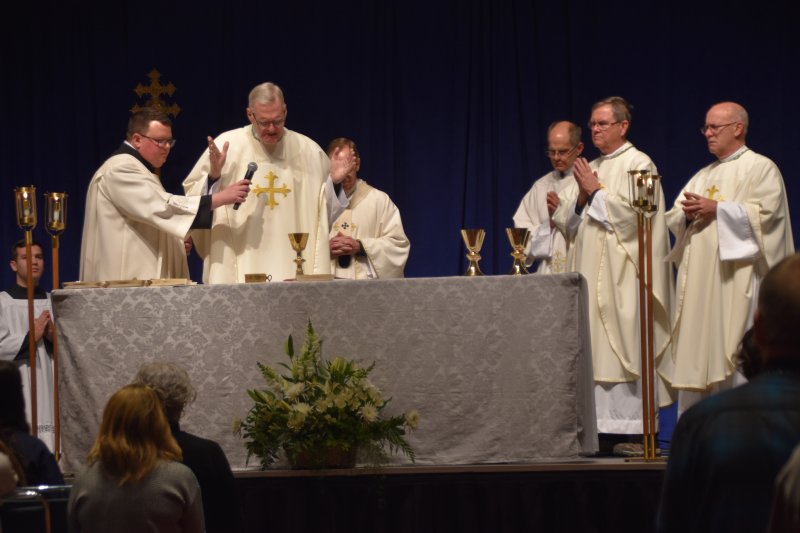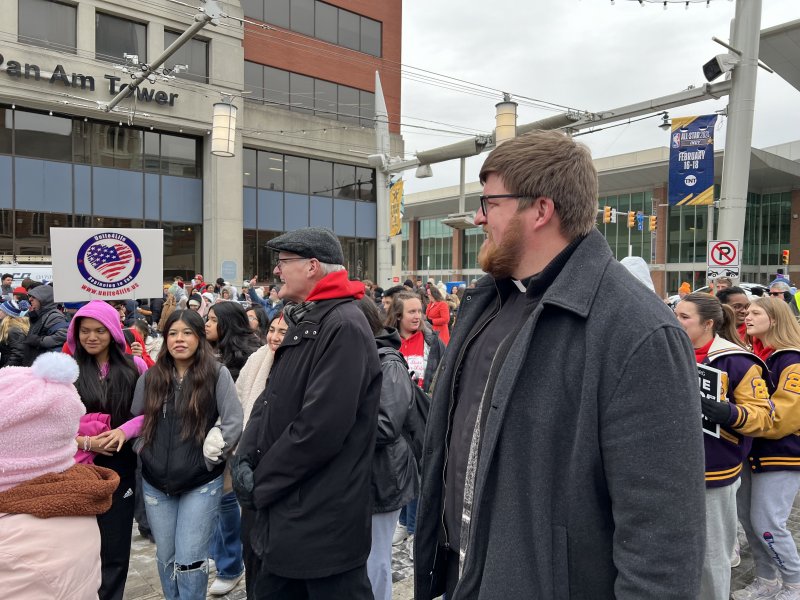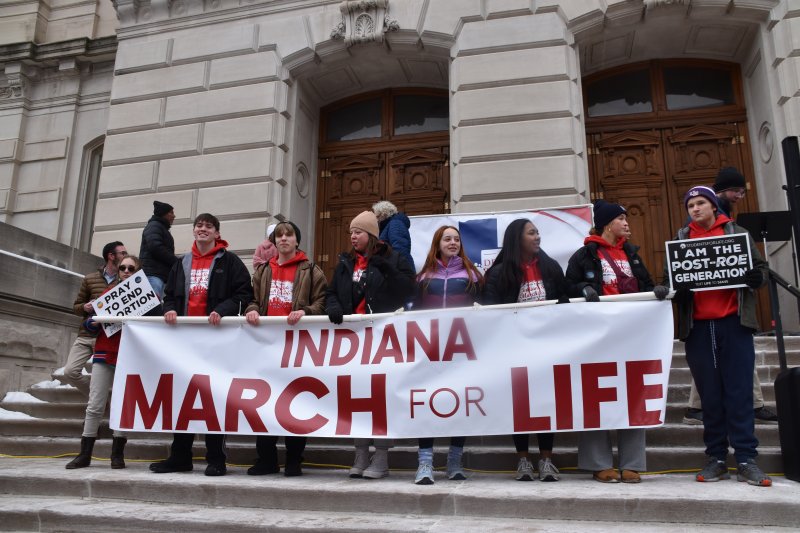By Natalie Hoefer
The Criterion
Special to The Message
Editor’s note: The Message staff contributed to this story.
The seventh Indiana March for Life and Mass for Life on Jan. 22 in Indianapolis were ones for the record books.

For the first time, groups from all five Indiana dioceses participated. They numbered an estimated 1,800 — shattering last year’s record of 1,100.
For the first time, nearly all of Indiana’s bishops — save for one who was out of the country — concelebrated the Mass. They were joined by nearly 30 priests from throughout the state.
And for the first time, Mass was celebrated in the Indiana Convention Center in Indianapolis — the number of participants could no longer fit in the former location, St. John the Evangelist Church in Indianapolis.
During his homily, Archbishop Charles C. Thompson offered a challenge to the roughly 1,800 youths and adults.
“Anytime I say, ‘United we stand,’ I want you to reply, ‘Divided we fall,’ ” and vice versa, he said.
It was an engaging tactic as he interspersed the phrases throughout his homily, keeping the listeners on their toes.
But mostly it was a statement on what happens when pro-life advocates from all corners of Indiana unite as one to support the sanctity of all life in their home state.

‘The movement of the Holy Spirit’
When the 1973 Roe v. Wade decision was overturned by the Supreme Court in June 2022, and abortion regulation returned to the states, a conversation was raised about where to send pilgrims in 2023 – to the national march or the state march.
As a result, Brie Anne Varick, director of the archdiocesan Office of Human Life and Dignity, said St. John the Evangelist Church “was overflowing.”
The Indiana March planning team saw “the movement of the Holy Spirit,” Varick said, and they asked Archbishop Thompson about moving the Mass to the Indiana Convention Center. The Indiana bishops “unanimously agreed.”
This is the second year the Diocese of Evansville decided to participate in the state march in Indianapolis. This year, more than 140 high school students and adult chaperones marched.
“Due to the (Dobbs decision), a local effort advocating for the protection of every human life is so necessary,” Jeremy Goebel, Diocese of Evansville Director of Youth and Young Adult Ministry, said. “This local effort also helps the pro-life movement to hit home in a deeper sense because it's taking place right here in our home state. Events like this remind us that each human life has irrevocable dignity and value.”
Evansville’s Reitz Memorial High School senior Aidan Mohr remarked on the Mass as an important part of the Indiana March for Life. He was “very excited” about the liturgy.
“I love Mass,” he said. He called the Mass for Life in particular “a beautiful, pro-life liturgy and expression of our faith.”

‘Healing wounds, transforming hearts’
The convention center’s largest ballroom was packed with about 1,800 youths and adults from schools and parishes throughout the dioceses of Evansville, Fort Wayne-South Bend, Gary and Lafayette, as well as the Archdiocese of Indianapolis.
When it comes to sports, Archbishop Thompson said, “There is nothing wrong with celebrating success. But the celebration must not deflect from the task ahead.”
The same is true of the need to stand up for the sanctity of life from conception to natural death, he said, even after the June 2022 overturning of the Supreme Court’s 1973 Roe v. Wade decision legalizing abortion nationwide — and even after an Indiana law safeguarding the lives of nearly all unborn children went into effect last August.
“Our gathering to pray and march for life is as important today as at any other time,” he said.
The Indiana March for Life has “never been about merely overturning laws, but healing wounds, transforming hearts,” the archbishop explained. “It is for this very reason that we must keep our center of gravity with the altar rather than the capitol, prayer rather than politics, in divine grace rather than in human merit, dialogue rather than condemnation, and mercy rather than demonization.”
“United we stand,” he added. “Divided we fall,” the congregation responded.
Referring to the day’s Gospel reading from Mark 3:22-30, Archbishop Thompson noted that Jesus “does not hesitate to explain that a kingdom or house divided cannot stand. … It is the Holy Spirit that unites, or the demonic that drives us to dehumanize and even demonize one another.”
He noted that such lack of respect for human dignity leads to the polarization so prevalent in today’s world.
To combat such division, the archbishop said, the Church and its members need “to be intentionally synodal in the commitment to mutual respect, to accompaniment, to dialogue and encounter, with Christ at the center — the beauty, the truth and the goodness of God, not any particular ideology or agenda or ego.”
He went on to note, “In the Church's understanding, a pro-life witness includes defense and care for the unborn, for the mother — whether wed or unwed, for the pregnancy — planned or unexpected, for the sick, the elderly, the poor, the immigrant, the refugee, the imprisoned, those with differing political views, those suffering from mental illness, persons of all ethnicities and religious beliefs” and more, he said.
As for this annual public witness to the sanctity of life, it is “most appropriate for Catholics to mark this day foremost with the celebration of the Eucharist, the source and summit of our identity and our mission, our ministries, and our services,” Archbishop Thompson noted. “Whatever progress we make in this cause, let us never underestimate the grace of God working in us.
“Divided we fall,” he said in closing. After the congregation answered, “United we stand,” he added, “May it be forever.”
